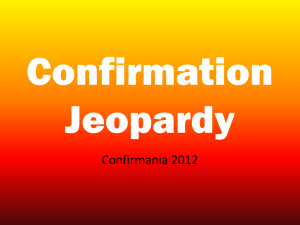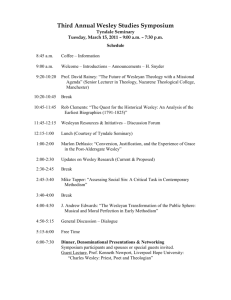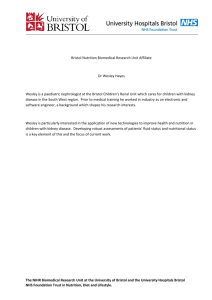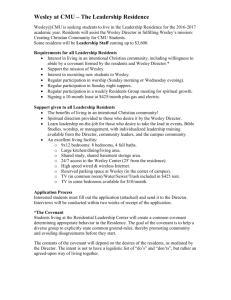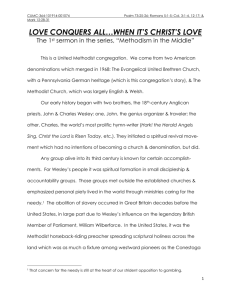The Theology of John Wesley, Holy Love and the Shape of Grace
advertisement
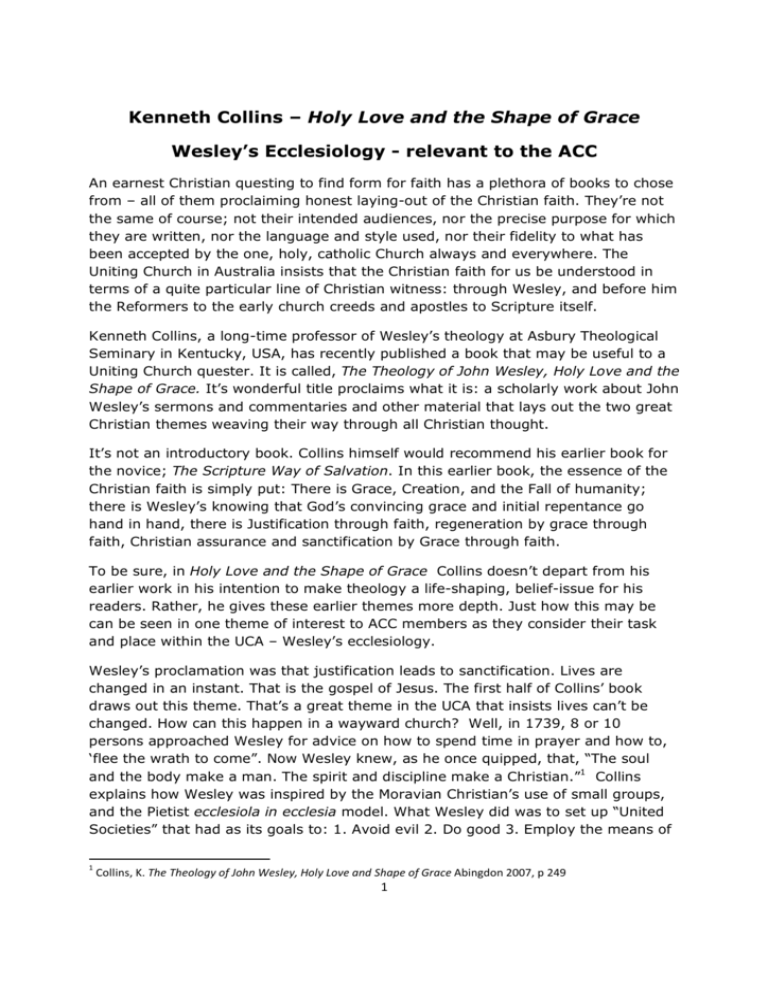
Kenneth Collins – Holy Love and the Shape of Grace Wesley’s Ecclesiology - relevant to the ACC An earnest Christian questing to find form for faith has a plethora of books to chose from – all of them proclaiming honest laying-out of the Christian faith. They’re not the same of course; not their intended audiences, nor the precise purpose for which they are written, nor the language and style used, nor their fidelity to what has been accepted by the one, holy, catholic Church always and everywhere. The Uniting Church in Australia insists that the Christian faith for us be understood in terms of a quite particular line of Christian witness: through Wesley, and before him the Reformers to the early church creeds and apostles to Scripture itself. Kenneth Collins, a long-time professor of Wesley’s theology at Asbury Theological Seminary in Kentucky, USA, has recently published a book that may be useful to a Uniting Church quester. It is called, The Theology of John Wesley, Holy Love and the Shape of Grace. It’s wonderful title proclaims what it is: a scholarly work about John Wesley’s sermons and commentaries and other material that lays out the two great Christian themes weaving their way through all Christian thought. It’s not an introductory book. Collins himself would recommend his earlier book for the novice; The Scripture Way of Salvation. In this earlier book, the essence of the Christian faith is simply put: There is Grace, Creation, and the Fall of humanity; there is Wesley’s knowing that God’s convincing grace and initial repentance go hand in hand, there is Justification through faith, regeneration by grace through faith, Christian assurance and sanctification by Grace through faith. To be sure, in Holy Love and the Shape of Grace Collins doesn’t depart from his earlier work in his intention to make theology a life-shaping, belief-issue for his readers. Rather, he gives these earlier themes more depth. Just how this may be can be seen in one theme of interest to ACC members as they consider their task and place within the UCA – Wesley’s ecclesiology. Wesley’s proclamation was that justification leads to sanctification. Lives are changed in an instant. That is the gospel of Jesus. The first half of Collins’ book draws out this theme. That’s a great theme in the UCA that insists lives can’t be changed. How can this happen in a wayward church? Well, in 1739, 8 or 10 persons approached Wesley for advice on how to spend time in prayer and how to, ‘flee the wrath to come”. Now Wesley knew, as he once quipped, that, “The soul and the body make a man. The spirit and discipline make a Christian.”1 Collins explains how Wesley was inspired by the Moravian Christian’s use of small groups, and the Pietist ecclesiola in ecclesia model. What Wesley did was to set up “United Societies” that had as its goals to: 1. Avoid evil 2. Do good 3. Employ the means of 1 Collins, K. The Theology of John Wesley, Holy Love and Shape of Grace Abingdon 2007, p 249 1 grace. “United Societies” were made up of several large groups called, “bands” and these in turn were made up of smaller groups called, “classes”. The idea of this organization was to provide a practical means to foster repentance from an old way of life so that in time sins would be forsaken and gracious tempers of holy love would arise in the community and hearts of members. Any person whose life showed progress towards “entire Christian perfection” could lead these groups, regardless of their social status. Collins calls this the ‘genius of the Methodist system” 2. In time, as Wesley’s movement developed, Methodism became an evangelical order within ecclesia Anglicana.3 Whereas the Anglican church of the 18th Century mirrored the class conscious stratification of the day, Methodist societies welcomed all who would repent and seek sanctified lives. Wesley’s idea was that the mother church needed constant reform and the Methodist societies benefitted from the mother church’s polity, church discipline and correct doctrinal judgments. Collins comments that, These communions of faith demonstrated both in thought and practice how an intentional and committed group of Christians could be within a church with a gracious and holy purpose without raising the specter of schism.4 In his lifetime, Wesley strongly opposed his select society separating, warning; “But whenever the Methodists leave the Church, God will leave them.”5 Collins says Wesley was afraid Methodists would lose its ‘way, identity, and purpose’ separated from the Catholicity of the church. Collins calls Wesley’s ecclesiology, “…a dynamic, charismatic understanding of the church and one in which reform is ongoing.”6 Perhaps Wesley and his ecclesiology was what the writers of the Basis of Union had in mind in paragraph 11, “The Uniting Church acknowledges that God has never left his Church without faithful and scholarly interpreters of Scripture, or without those who have reflected deeply upon, and acted trustingly in obedience to, his living Word.” Well, there are certain parallels between the ACC and UCA and Methodist Societies and the Church of England. For one thing, the 18th Century Church of England mirrored the 18th Century society – by accepting class conscious stratification. So the UCA mirrors a tolerance of immoral behaviours that is 20th Century Australia. And, like the early Methodist Societies, the ACC seeks to hold fast to the means of grace and see it effective in members’ lives. And, like Wesley, the ACC has not sought to separate from the UCA, but to call the UCA to confess its own Basis of Union. 2 Ibid 250 Ibid 252 4 Ibid 247 5 Ibid 252 6 Ibid 253 3 2 However, there are certain dissimilarities. Unlike Wesley, the ACC does not recognize the church in which it finds itself as holding to correct doctrine. Whether the ACC will succeed in its legitimate function as a reforming order with the wayward UCA, or whether it will also eventually separate, as Methodists eventually did, is matter for our Lord to lead us. There is a further problem to which Collin’s explication can help keenly. Collins’ insights can help the ACC reconcile the Methodist way of thinking and doing with the Reformed. Why should we lose Wesley’s great heritage just because the Basis of Union is too short to explain how we should have them together? There is much in Collin’s book that is of relevance to us. I wish we could invite Dr. Collins to Australia to address us on Wesley and encourage us in only we are called to be, faithful witness to our Lord who saves us. by Paul Langkamp paul_langkamp@yahoo.com 3

